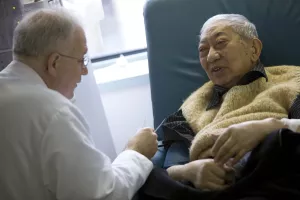Did you know that Polycystic Kidney Disease (PKD) is a genetic disorder that you are born with? This condition primarily affects the kidneys and, in some cases, the liver, too. At Tufts Medicine, we understand that personalized treatment is key to living a healthy life. With our expert care, you can take control of your health and enjoy life to the fullest.
PKD + your genes
Polycystic Kidney Disease (PKD) is a genetic condition that is usually inherited from one or both parents to their child. PKD does not have a cure, but there are ways to manage the condition and slow its progression through the use of medications and therapies. We'll be by your side to provide personalized care to meet your needs, including access to new and promising therapies, genetic counseling and pain management.

Conditions
Did you know that there are two different types of PKD? Both types cause many cysts to grow inside your kidneys, sometimes even thousands. These cysts can also make your kidneys grow much larger than usual. When too many cysts grow or get too big they may damage your kidneys.
Often develops between ages 30 to 40 years old. Symptoms of ADPKD include:
- Pain in your back and sides
- Headaches
- High blood pressure
- Blood in your urine
- Urinary tract infections
- Kidney stones
- Impaired growth or failure to grow
ARPKD is less common, but its symptoms and complications often are more serious. It frequently develops in childhood, and symptoms include:
- High blood pressure
- Trouble breathing
- Internal bleeding
- Chronic kidney disease or kidney failure
- Liver problems
Testing
To help us better understand how your kidneys are functioning, we may recommend some imaging and laboratory tests depending on your PKD diagnosis. These tests will help us get a clearer picture of how your kidneys are functioning, these include diagnostic tests like:
- Ultrasound
- CT scan
- MRI scan
- Urine test
- Blood draw
Treatments
Using the latest research and working with you as our partner, we'll develop a personalized treatment plan to help you be your best and healthiest. This may include a combination of therapies such as:
- Surgery (such as laparoscopic cyst reduction)
- Pain management therapies
- Image-guided procedures (cyst aspiration and ablation)
- Dialysis services
- Kidney transplantation
- Genetic screening, counseling and family planning
- Medication
- Nutrition and lifestyle coaching
- Clinical trials
Awards + accreditations
Polycystic Kidney Foundation Center of Excellence (awarded to Tufts Medical Center)

From regular office visits to inpatient stays, find the healthcare you need and deserve close to home.

Meet the doctors and care team devoted to supporting you every step of the way along your path to better health.